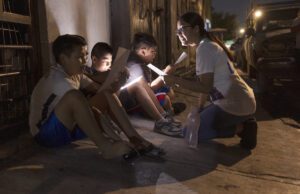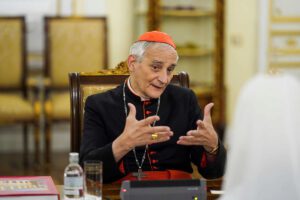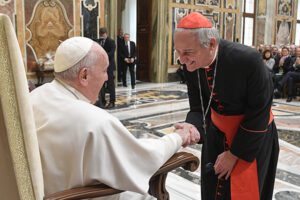(OSV News) – Amid wars in the Middle East and Ukraine, this year’s World Mission Sunday is “even more important” than ever, said an executive from the U.S. offices of the Pontifical Mission Societies.
The universal Catholic Church marked the observance Oct. 22, and the collection taken up that day forms the primary financial support for the societies, which have a presence in some 1,100 dioceses in Africa, Asia, Latin America, the Pacific Islands and parts of Europe.

Pope Francis’ theme for the 2023 World Mission Sunday was “Hearts on fire, feet on the move,” which recalls the encounter between two disciples and the risen Christ on the road to Emmaus (Lk 24:13-35).
In an Oct. 18 message he recorded for the Pontifical Mission Societies and posted by the societies on X (formerly Twitter), Pope Francis said that World Mission Sunday was about “worship and mission.”
Speaking in Spanish, Pope Francis urged the faithful to “recognize the Father and worship him in spirit and truth, and go out to announce that message. Not as one who proselytizes, but as one who shares a great grace.”
He described it as a mission “shared with brothers,” that says “this is what I feel, this is the grace I received, I pass it on to you, I give it to you.
“You can do this if you are capable of worshipping,” said Pope Francis.
With “the ongoing situation in the world,” World Mission Sunday “should actually open us to be even more generous,” Ines San Martin, vice president of marketing and communications for the societies’ U.S. office, told OSV News from Rome ahead of the observance. “Now more than ever, the church in the Holy Land needs us, the church in Ukraine needs us.”
“The oldest church has to help the youngest church currently suffering so much due to the devastation of war. We at TPMS strive to model peace by supporting all those suffering from conflicts around the world,” Msgr. Kieran Harrington, national director of the Pontifical Mission Societies, said.
The societies’ worldwide network, which operates at the service of the pope, consists of four organizations designated as pontifical by Pope Pius XI in 1922.
The Society for the Propagation of the Faith supports the evangelization efforts of the local church; the Missionary Childhood Association educates children about their part in the church’s missionary outreach; the Society of St. Peter the Apostle trains the next generation of missionary clergy and consecrated religious; and the Missionary Union of Priests and Religious focuses on forming clergy, religious and pastoral leaders more deeply in their role as evangelizers.
The collection taken up on World Mission Sunday forms the primary financial support for the Pontifical Mission Societies, with U.S. Catholics donating about $30 million in 2022.
The generosity of the nation’s Catholic faithful “cannot be underscored (enough),” said San Martin.
“World Mission Sunday is a concrete response to what is happening in the world,” she said.
Cardinal Christophe Pierre, papal nuncio to the U.S., noted in a reflection for the autumn 2023 issue of Mission magazine, published by the societies, that the collection makes it possible “to provide annual subsidies to missionary dioceses, and to directly support mission seminaries and religious formation houses, the education of children in mission schools, the building of chapels and churches, as well as sustaining homes for orphaned children, the elderly and the sick.”
The support is far more than financial, said San Martin.
“When we say that (the societies) feed the poor, we do mean hunger, but we also mean the hunger of the soul,” said San Martin. “And World Mission Sunday is a great response to give peace — not just material peace, but also spiritual peace to those in need.”
Having a missionary spirit “means we truly are open to our brothers and sisters, and (we are) sharing with others the joy that comes from having met Christ,” she said.
That joy can help to build peace among communities and nations, San Martin said.
“Do you really hate your brother when you see Christ in him?” she said.
Yet “the problem is that we have in many ways given up our missionary animations,” San Martin admitted. “It should be a desperate need (for us) to go out and spread the Gospel, to really answer the great command (of Christ) to make disciples of all nations.”
World Mission Sunday is an opportunity for Catholics to recommit themselves to fulfilling that task, she said, adding “it truly does start with knowing that Jesus died for us to save us.”


